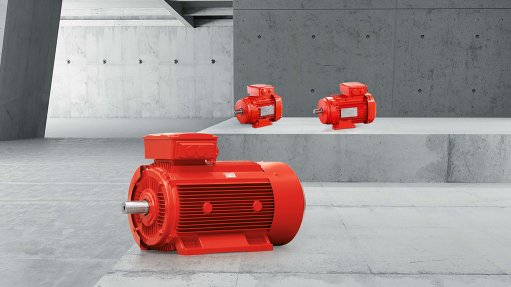
THE SMART MOVE With the impending implementation of minimum energy requirement standards in South Africa, transitioning to more energy efficient IE3 motors is the logical decision
The time is right for South Africa and Africa, in general, to invest in IE3 motors, especially with minimum energy requirement standards (MEPS) expected to come into effect by the end of the year, says drive engineering specialist SEW-EURODRIVE electronics business development manager Willem Strydom.
He encourages companies to convert to IE3 motors sooner rather than later, noting that there will likely be an uptick in demand for these motors the closer South Africa gets to officially enforcing MEPS.
“We don't know what impact the implementation of MEPS will have on the price of these motors locally and globally, or on the turnaround time for delivery. However, SEW-EURODRIVE’s stockholding in South Africa is substantial. Therefore, stock availability shouldn't be a problem from our side.”
South Africa continues to lag in terms of the uptake of energy efficient IE3 motors despite having struggled with electricity disruptions, owing to inadequate generation capacity, since 2008.
“The timing of the MEPS couldn’t be better. SEW-EURODRIVE South Africa implemented IE3 motors as a standard several years ago and has been using nothing but IE3 motors on all our equipment since. We are fortunate that our head office is in Europe, where SEW-EURODRIVE is already installing IE4 and IE5 motors, which has paved the way for IE3 deployment locally. Therefore, we couldn't be more ready for this.”
Not only is mandating the use of IE3 motors important to reduce energy demand while South Africa navigates its energy crisis, but also for ensuring a greener, smaller carbon footprint that will help to realise the global goal of net-zero emissions by 2050.
Overall, SEW-EURODRIVE customer feedback about the implementation of the MEPS has been positive, notes Strydom.
Notably, the company is experiencing increased demand for IE3 motors from industries that were previously less focused on their procurement.
“The mining industry has started specifying IE3 motors as a minimum standard; however, other industries, such as the food and beverage industry, have been doing so for the past two or three years,” highlights Strydom.
In the mining industry, the uptake of IE3 motors is partly driven by environmental, governance and social compliance, the limited electricity supply on offer in South Africa, and by the faster return on investment (ROI).
“The savings associated with the reduced costs of operating more energy efficient motors really shortens the time in which you will realise your ROI,” explains Strydom.
Testing conducted by SEW-EURODRIVE on bottling lines at local beverage manufacturers, for example, has proven that the shortened ROI makes the decision to convert to IE3 motors a “logical decision”, he says.
SEW-EURODRIVE’s studies have been conducted in conjunction with the company’s more efficient gearbox ranges and, in one instance, SEW-EURODRIVE managed to achieve an electricity saving of almost 38%.
“That was a significant energy saving for the customer, considering that on an average production line, there are 100 to 160 motors. That specific project is six years old this year, and to this day, that bottling line has not experienced downtime owing to motor failure, shutting down only to conduct maintenance half a day a week,” advises Strydom.
Consequently, SEW-EURODRIVE’s motors need to be reliable.
“The cost of downtime cannot be underestimated at all. IE3 motors, when used in conjunction with variable-speed drives, are less demanding on the entire installation. They don’t draw as much electricity, owing to fewer losses in the drive system, thereby improving energy efficiency,” he explains.
Time to Phase Out
While Strydom believes it will take a few years before IE1 and IE2 motors are no longer serviceable locally, he emphasises that as MEPS are implemented more stringently, the abolition of these motor types will have to follow.
“SEW-EURODRIVE still supports IE1 and IE2 motors from a repairs perspective. Every single product that we phase out, we support for at least ten years after end of sales. However, I see IE1 and IE2 motors falling away over the next few years.”
SEW-EURODRIVE’s IE3 motors allow for improved energy efficiency through three main changes – the quantity and quality of the copper used in the motor windings, and the construction of the motor windings in the motor stator – as well as minor changes to the bearings.
Strydom says there is probably between 7% and 8% difference in efficiency when comparing IE1 and IE3.
“While this might not sound like a lot, considering that electric motors potentially consume 40% of the electricity used globally, it’s a massive saving. Therefore, changing from IE1 to IE3 will make a considerable difference in South Africa, whose electricity is predominantly generated through fossil fuels, not only from a consumption point of view but also in terms of the carbon footprint of local manufacturers.”
To aid customers in their decision-making process, SEW-EURODRIVE offers a free energy audit service that first tests the energy consumption of existing IE1 or IE2 motors.
“We then install an IE3 motor on site and perform an electrical energy consumption test again, providing the customer with the results to compare and decide whether it is worthwhile investing in IE3 motors before doing so becomes compulsory,” concludes Strydom.